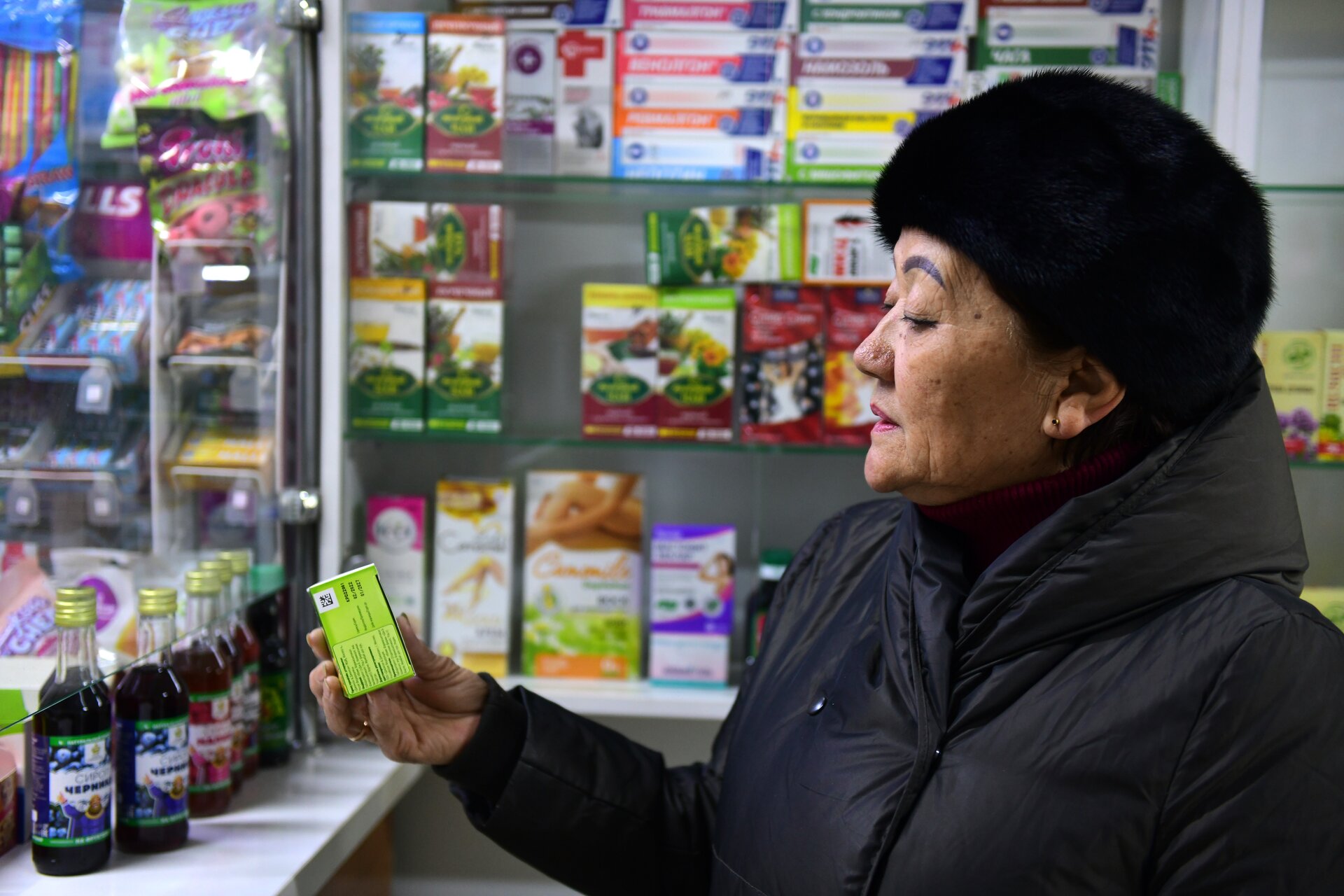 Ymyt Berdibekova, a 66-year-old pensioner from Bishkek, is saving an estimated 10% of her spending on hypertension medicines thanks to a new initiative of the Ministry of Health of Kyrgyzstan.
Ymyt Berdibekova, a 66-year-old pensioner from Bishkek, is saving an estimated 10% of her spending on hypertension medicines thanks to a new initiative of the Ministry of Health of Kyrgyzstan.
Ymyt has been struggling with hypertension for over 36 years and must take medicine twice daily. She used to spend half of her monthly pension on her treatment, and she worked in a local shop to earn extra money as she could not meet her basic needs. In 2023, life became a bit easier for her and many others because, for the first time in Kyrgyzstan, prices of selected medicines were regulated, making them more affordable and accessible to the population.
In May 2023, a government decree introduced price controls for all imported medicines included in the country’s list of essential medicines, including several medicines used to address the burden of noncommunicable diseases (NCDs), such as hypertension. The price control mechanism has reduced the cost of medicines for hypertension for around 420 000 people in Kyrgyzstan.
Ensuring financial protection to achieve UHC
Although this change has had a positive impact for Kyrgyzstan’s population, progress is under threat since the recent removal of medicines from the value added tax (VAT) exemption list. The introduction of a VAT on medicines, including those on the country’s list of essential medicines, may offset the financial benefits of the price control mechanism for people such as Ymyt.
While other benefits of the price control mechanism remain, such as ensuring the availability of lower-priced medicines when people need them, constant vigilance and advocacy are needed to ensure that the population is better protected from financial hardship.
Across the WHO European Region, financial hardship is largely driven by out-of-pocket payments for outpatient medicines, medical products and dental care – services that are commonly delivered or managed in primary care settings – indicating significant gaps in the coverage of primary care in many countries.
For this reason, WHO suggests that countries consider exempting essential medicines from taxation and that this is coupled with measures to ensure that the policy results in lower prices of medicines to patients and purchasers.
With support from the UHC Partnership since 2018, WHO has worked closely with Kyrgyzstan’s Ministry of Health (MoH) to improve the affordability of medicines for people living with NCDs. This is critical for ensuring that people do not experience financial hardship due to accessing health care, a fundamental element of Universal Health Coverage.
The UHC Partnership operates in over 125 countries, representing over 3 billion people. It is supported and funded by Belgium, Canada, the European Union, France, Germany, Ireland, Luxembourg, Japan, the United Kingdom of Great Britain and Northern Ireland, and WHO.
WHO cooperation in Kyrgyzstan
In November 2023, WHO and the Ministry of Health signed a 7-year Country Cooperation Strategy for 2024–2030 seeking to achieve clear targets in 7 strategic priority areas, within all of Kyrgyzstan’s 7 oblasts.
Hypertension is the first strategic priority area in the strategy, and the MoH and WHO will build on the advances supported by the UHC Partnership to support more people like Ymyt to ensure that their high blood pressure is effectively controlled without financial hardship.
As well as improving the health and financial protection of individuals, these changes will also bring co-benefits to the wider Kyrgyz economy. Evidence suggests that the economic payoff of improved treatment of hypertension outweighs the cost by about 18 to 1.
“WHO’s work in Kyrgyzstan is focused squarely on improving population health. Reducing the rates of undiagnosed and uncontrolled hypertension is a strategic priority for us for the next 7 years. Enhancing access to reasonably priced, high-quality essential medicines for those with hypertension, and for all who need them in Kyrgyzstan, will help to reduce morbidity and mortality and accelerate health and developmental gains throughout the country,” said Liviu Vedrasco, WHO Representative to Kyrgyzstan.
